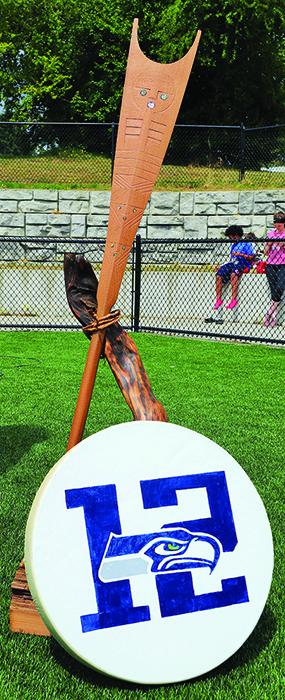Follow the link to download the September 30, 2023 issue of the syəcəb
Category: Tulalip News
Gifts from the Heart
Forming medicine through unity at fundraiser for Lahaina
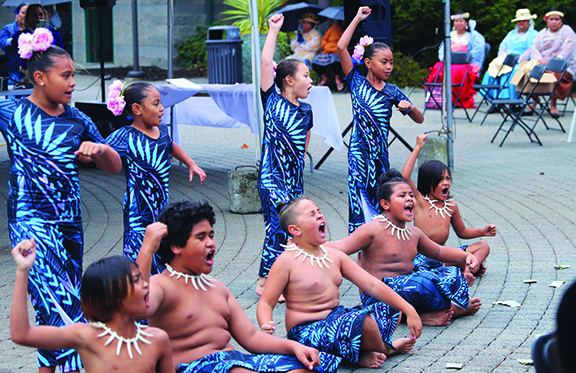
By Micheal Rios, Tulalip News
On Saturday, September 23, Nakani Native Program hosted a heartwarming, cross-cultural fundraiser at the Tulalip Amphitheatre to support recovery efforts for the Lahaina community devastated by wildfires on the island of Maui.
For those readers unaware, Lahaina, the former capital of the Hawaiian kingdom, made national headlines in August after being destroyed by wildfires. The rural island town known for its cultural vibrancy has 13,000 community residents now reeling in the tragic aftermath. Many organizations and nonprofits are working to support recovery efforts, from medical supplies and financial aid to clothing, hygiene products, and basic household items.
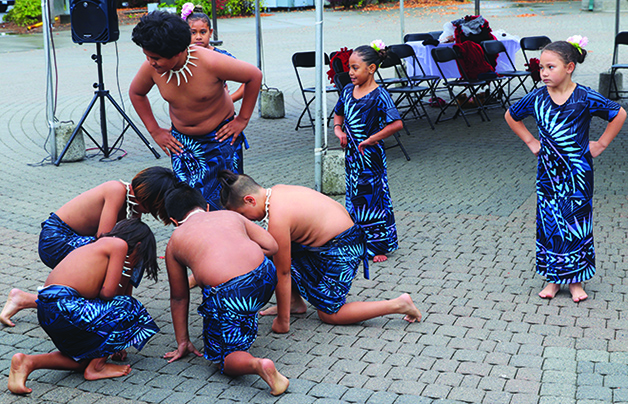
As a Native American sovereign, Tulalip intrinsically holds a strong connection with Native Hawaiian communities located across the islands. Our cultures, separated by the Pacific Ocean, are geographically distant but spiritually linked. For Tulalip tribal members like Martin Napeahi, this connection is deepened through kinship ties and family relations. His mother is Tulalip elder Annette Napeahi and his father is a military veteran originally from Hilo, Hawaii.
“Our organization strives to serve all our Native people, which includes Native Americans, First Nations, Polynesians, Hawaiians, Samoans, Tongans, and more,” explained Martin, who holds the prestigious title of Nakani Program Director. “We are the same people. We share the same blood. We share the same trials and tribulations. And why we are here today is because we also share the same deep connection and love for our land.
“This fundraiser for the people of Lahaina is to try and do something truly impactful for our brothers and sisters who lost so much,” he continued. “I’m thankful for Tulalip hosting and beyond grateful for all those who traveled here today to take part in this healing for Lahaina.”
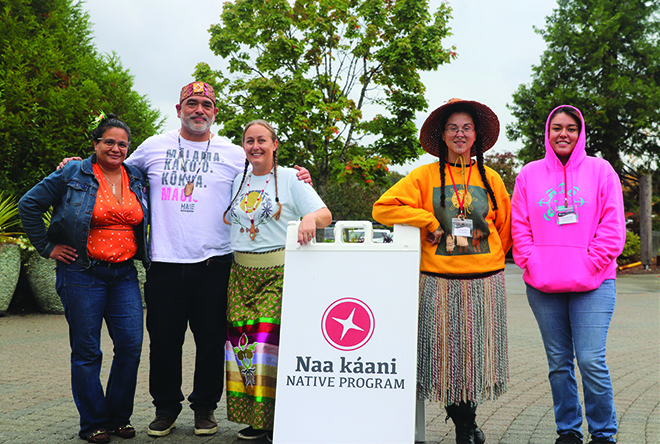
Cultural performances from across the islander spectrum were received with great joy by fundraiser attendees as they sat under the amphitheater tarps to avoid the gusting winds and torrential downpours. While physically cold in the frigid fall temperature, their hearts were warmed by weather-proof performances that went on undeterred.
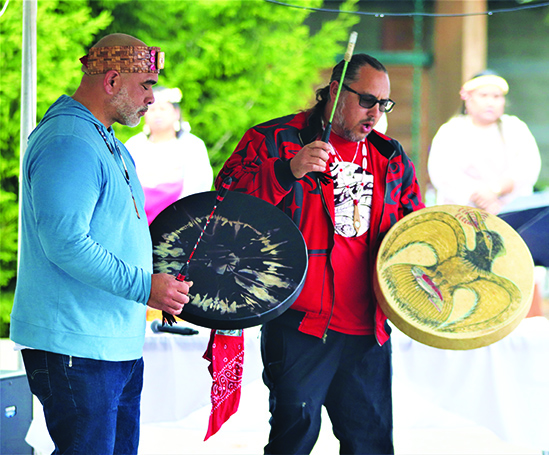
Tulalip culture bearer Andy William, flanked by Martin, offered songs accompanied by traditional hand drum beats. Samoan youth from Auburn-based Faatasi Performing Arts sang and danced with a rhythm all their own, overcoming their pre-performance shivering and exposed, cold feet, that overwhelmed the crowd to give generously.
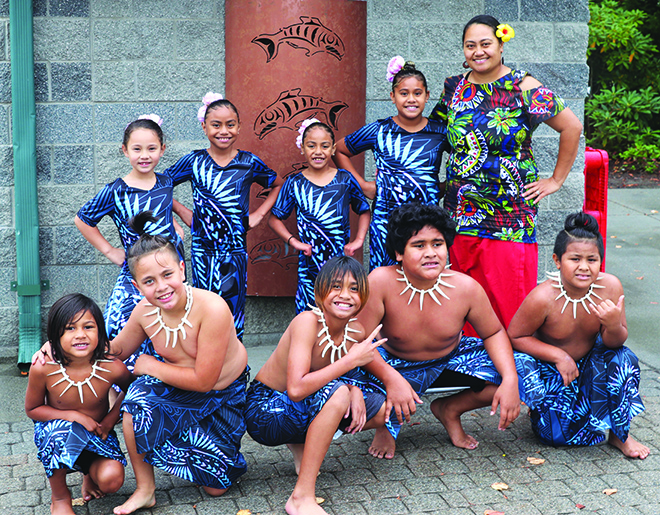
“We are so honored to be a part of this event and offer our support for the families in Mauri,” said Fia Taito, youth group coordinator. “These amazing children, ranging from age 5 to 10 years old, practiced so hard to memorize the actions and words of each song presentation. And look. We’ve been blessed as the rain has paused just for us.”
Fia then asked her youth-led Faatasi group to state their mission. To which the kids yelled in unison, “Our mission is to bring community together through arts of love! Serving one family at a time! Hooah hooah!”
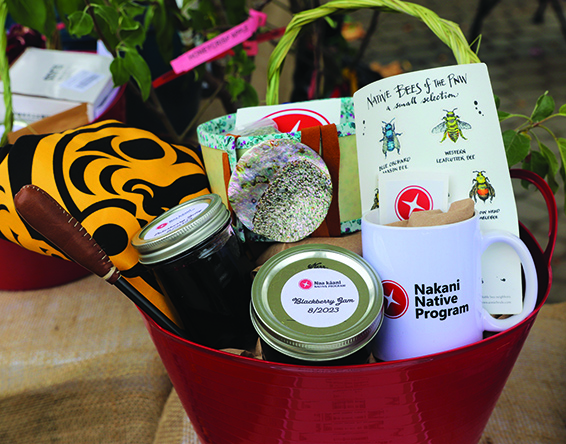
Over the course of the 6-hour long fundraising event, attendees were encouraged to buy raffle tickets, lunch and dinner plates loaded with local cuisine, or simply donate funds via a QR code on their phones. It was stated repeatedly that 100% of all proceeds are going to the Kako’o Maui Fund to support those affected by the western Maui wildfires.
In the weeks preceding the fundraiser, Nakani staff worked tirelessly to garner support among local tribes and Native artisans to create culture-filled gifts and donation baskets that were used as further incentives to purchase raffle tickets. Raffle prizes included a hand-carved and painted paddle by Martin, an original print by Monie Ordonia, Devil’s Club drum earrings by Kiera Blum, a wool skirt and earring set by Krislyn Parks, an assortment of 8th Generation blankets, and much more.
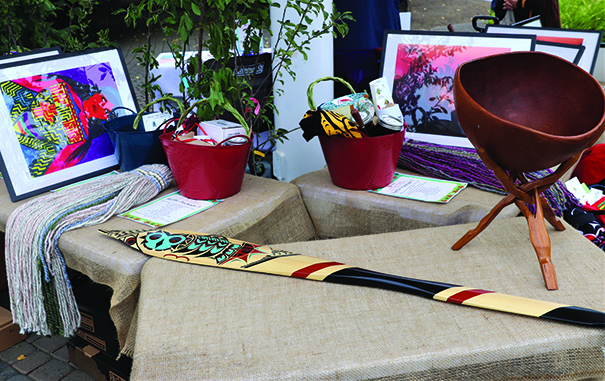
“It took a ton of coordination to collect these wonderful donations from Native artists and Native-owned businesses across the Coast Salish territories. It was a four-week labor of love that was only possible because of the team we have,” shared Linzie Crofoot, NaKani’s traditional medicine director.
“The foundation of our medicine is love,” she added. “So when we are doing anything and we’re doing it with love, whether it’s within our community or for those outside of our community, then we are practicing medicine and doing healing work. In essence, we are using our love as a means to heal, and that’s what gifts from the heart are truly about. This is us sending our love to our relatives in Lahaina, who we feel deeply for, in the best way we know how, and in keeping with our traditions as Native people.”
Indigenous Cinephiles: Hibulb Cultural Center now accepting entries for annual Film Festival
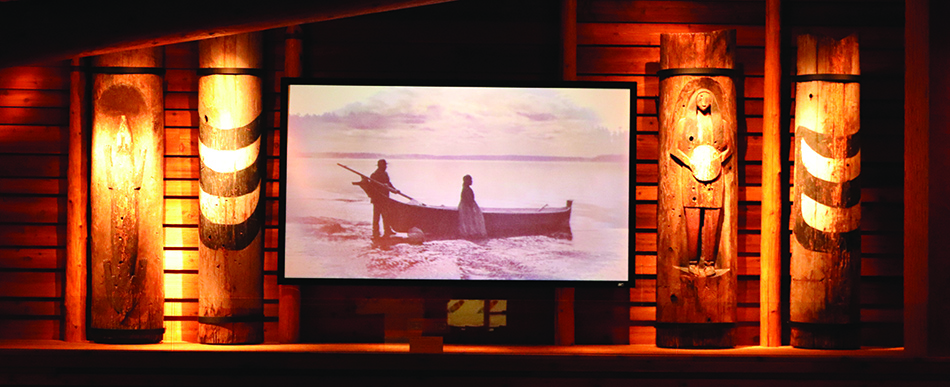
Submitted by Ana Ramirez; photo by Kalvin Valdillez, Tulalip News
The 11th annual Hibulb Cultural Center Film Festival will be taking place November 4, from 11:00 a.m. – 6:00 p.m. We are very excited to be growing our film festival. So far, we have over 50 submissions.
Among the films being shown are a documentary short about Lily Gladstone, who is the lead actress in the upcoming film Killers of the Flower Moon, which will have its global theatrical release on October 20. Furthermore, we have a short film directed by Taietsarón:sere ‘Tai’ Leclaire, who was a writer and actor for NBC comedy Rutherford Falls. We also have a documentary short about Autumn Peltier, a First Nations Activist and Chief Water Commissioner for the Anishinabek Nation who has addressed the United Nations.
We will be showing youth friendly films in Classroom 2 from 1:00 p.m. – 3:00 p.m.
In Classroom 2, from 1:00 p.m. – 6:00 pm, we will be showing films in different languages about Indigenous communities across the globe, including Brazil (Portuguese), Latin America (Spanish), and even Taiwan (Mandarin Chinese). We are thrilled about the lineup of films so far made by Indigenous People and communities across the U.S., Canada, and New Zealand. We have a couple films in the Cherokee language as well.
This year we will be giving out seven awards, one for the seven Tulalip stories/values. These include the Crane and Changer, who teaches us to respect elders and pay attention to their good words; Her First Basket that teaches us to uphold and respect ancestral teachings; How Daylight was Stolen, which teaches us to value work to uphold and serve our people, and so on.
For more on the Tulalip story values, visit https://www.tulaliptribes-nsn.gov/WhoWeAre/MissionVisionAndValues
If you are, or know, a filmmaker, please submit your film at filmfreeway.com/HCC2023 from now until October 21. If you have questions or concerns about the Hibulb Film Festival, please contact Film Festival Coordinator and Education Curator, Ana Ramirez at ana@hibulbculturalcenter.org or by phone at 360-716-2640.
Purple October: Show your support for DV Awareness month at October 6 Coastal Jam
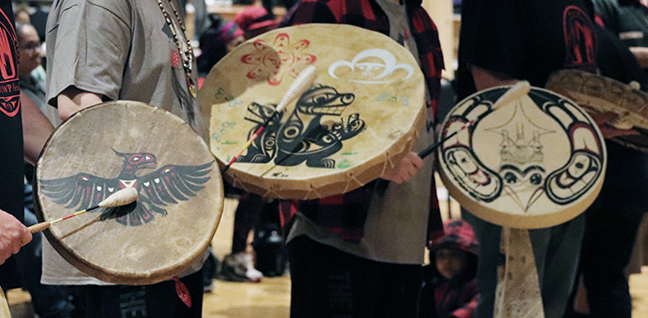
By Kalvin Valdillez, Tulalip News
Calling all drummers, singers, dancers, community members, and relatives of Tulalip, the Tribe’s Legacy of Healing program is in need of your good medicine on Friday October 6.
In an effort to raise awareness, provide support and resources to survivors and victims, and also open up discussion about domestic violence, the Legacy of Healing is hosting a dinner and a costal jam.
The idea behind the jam is that by uniting the people together in song and prayer, those who have endured an abusive relationship can feel the love and support from the community. And likewise, those who are silently going through it in their home life, can come to a safe space and identify their available resources, ask questions, and speak in confidence with a professional from the Legacy of Healing.
Said Legacy of Healing’s Lead Family Advocate, Kaely Wickham, “It’s important to know when you’re in that situation you can feel isolated or like you’re going crazy, and that what’s happening to you is not real. It’s important to increase awareness that this is actually serious. You’re not alone. We do care. You’re not going crazy. If you feel that you’re not in a healthy relationship, we’re here to support you and give that knowledge of what domestic violence is – we’re here to help you learn about it. Our services are entirely confidential and there’s no pressure to report about what happened to you.”
For the past several years, the department has taken part in DV Awareness Month, a nationwide initiative that dedicates the month of October to bring attention to the issue of domestic violence and to show support to the victims and survivors of DV.
Through film screenings, self-defense classes, trauma workshops, beading lessons and a number of other community gatherings, the Legacy of Healing has helped bring about a clearer understanding to Tulalip of what DV is. Additionally, the event goers will often take the chance to open up and share laughter, exchange stories, and at times, shed tears together. No matter what emotions are brought out at each gathering, more often than not, the participants walk away with a smile, their heads up high, and newfound optimism, knowing that they have the support of the Legacy of Healing and the community behind them.
While engaging their participants and clients in activities and open discussions, the Legacy of Healing has provided many opportunities for the people to learn about DV each October. That alone is extremely important because many are not able to recognize domestic violence as it’s occurring. And this is due to the fact that the majority of folk have misconceptions about what DV is exactly, and they do not realize that there are numerous ways an abuser asserts control and power in a relationship, including isolation, gaslighting, manipulation, among many others.
“A lot of people can kind of sweep DV under the rug because it happens slowly,” explained Marisa Chavez, Legacy of Healing Victim Advocate. “It’s not like the first time you meet somebody, you’re put in the hospital. It’s a slow build and you don’t often realize what’s happening until you’re really deep in it.
“Typically, people who are victims of domestic violence think that if they call law enforcement it’s because it’s something physical. But usually it starts emotional, then it goes to psychological – financial abuse, threats. And then it becomes physical. So, this month’s about educating and providing information for people to realize that it’s not okay that this is happening.”
Within Native America, DV has plagued our communities and statistics show that the Indigenous population is at a much higher risk of experiencing an abusive relationship compared to other ethnicities. According to the National Institute of Justice, 84% of Native women have experienced domestic violence in their lifetime, as have 81% of Native men.
However, it’s important to note that this study was conducted well before the coronavirus outbreak and those numbers are now projected to be on the rise. Not to mention that even with updated statistics, the amount of DV incidents may be higher, but do not necessarily reflect in research and studies due to underreporting.
To help prevent further underreporting and so the community knows how to identify DV, the Legacy of Healing compiled a list that reads as follows:
What Abuse Can Look Like
- Hitting, pinching
- Burning
- Pulling hair
- Pushing
- Strangulation
- Physical intimidation
- Use of weapons
- Forcing the use of substances
- Throwing items
- Punching walls
- Kicking in doors
- Requesting your login info
- Monitoring your social media- Stalking
- IPV sexual abuse
- Kicking
- Rape
- Forcing any sexual act
- Uses children against you
- Lies about your mental health
- Financial control
- Name calling
- Jealousy
- Shaming or humiliating you
- Blaming you for their actions
- Controlling where you go
- Gaslighting
- Love bombing
If you are experiencing any forms of abuse listed above, please do not hesitate to reach out to the Legacy of Healing. The program can speak in hypotheticals for those looking to discreetly acquire information. And if you are ready to take the next step, the department can also design a safety plan with you, for whenever you are ready to exit a DV relationship.
Noting that each circumstance is different, the Legacy of Healing understands that leaving a DV situation is difficult and can sometimes involve the court systems. The department wants to inform the community that if you are in a situation where you do have to go through tribal or state court, they will be there to support you emotionally throughout the entire process.
The Legacy of Healing is careful not to pass any judgements and allows their clients grace and understanding, because from a statistical standpoint, it could take a victim multiple attempts to leave an abusive partnership for good.
In previous years, the culture has been prevalent and at the forefront of many of DV awareness month gatherings at Tulalip. This year, the Legacy of Healing is returning to the ancestral ways with the coastal jam in hopes of not only giving a voice to all the local survivors and victims, but also amplifying that voice in-turn through the powerful songs of the sduhubš.
“From what we know, the reason we have these different crimes on our reservation is because it stems from the colonization that’s happened to us as a people,” stated Jade Carela, Director of the Legacy of Healing. “I think the healing piece for us is knowing this is not something that stems from us as a people. When you’re going through this process, that’s part of what you’re learning – that it’s not okay. It’s not who we are. It’s not something that comes from us. It’s something that was taught to us.”
The Legacy of Healing is asking for your assistance in raising awareness throughout the month by participating in their raffle ($5 for 1 ticket/$20 for 5 tickets) in which all of the proceeds go towards supporting survivors of DV. Over 20 prizes will be raffled off at the end of the month including a number gift cards and gift baskets, Xbox games, a ribbon skirt donated by Morning Star Creations, a beaded necklace by Winona Shopbell, beaded earrings by Paige Pettibon and Odessa Flores, and a cedar and abalone headband by Malorie Simpson.
To purchase a raffle ticket, you can catch the Legacy of Healing team and the Tulalip Foundation at the following locations/date/times:
- 10/2 on the second floor of the Tulalip Administration building from 8:00 a.m. – 9:30 a.m. and 11:30 a.m. – 1:30 p.m.
- 10/6 at the Greg Williams Court (Coastal Jam) from 4:30 p.m. – 7:00 p.m.
- 10/16 at the Tulalip Tribal Court from 3:30 p.m. – 4:30 p.m.
- 10/19 on the second floor of the Tulalip Administration building (Carmel apple social) from 11:30 a.m. – 1:30 a.m.
- 10/21 at the Tulalip Resort Casino (Semi-General Council) from 9:00 a.m. – 1:00 p.m.
- 10/31 at the Tulalip Gathering Hall (Employee Halloween Luncheon) from 12:00 p.m. – 2:00 p.m.

If you are looking for more ways to show your support throughout DV Awareness Month, you can order the Unity Elixir or the Violet Hope Lotus drinks from the café at the Tulalip Administration building, Ti Kupihali. The drinks are purple, which is the official color of the awareness month. In fact, October 19 is ‘Wear Purple Day’. Government employees and the Tulalip citizenry are encouraged to participate, so don’t forget to send photos of your team and your families decked out in purple gear to the Legacy of Healing.
As a reminder, the Domestic Violence Awareness Month Coastal Jam is scheduled to take place on October 6 at the Teen Center. Doors open at 4:30 p.m. and the first 200 people to arrive will receive a free t-shirt. Dinner will be served at 5:30 p.m. at the Don Hatch Court. And the costal jam will follow and is set to begin at the Greg Williams Court at 6:30 p.m.
If you or anybody you know is experiencing an abusive relationship, please do not hesitate to call the Legacy of Healing at (360) 716-4100 for assistance. And if you are in a crisis or an emergency situation, the Legacy of Healing provided a list of three additional hotline numbers that you can utilize during your time of need:
- The National Domestic Violence Hotline 1-800-799-SAFE (7233)
- Strong Hearts Native Helpline: 1-844-762-8483
- Domestic Violence Services of Snohomish County 425-25-ABUSE (22873)
Tulalip-Marysville Hawks battle it out on the gridiron
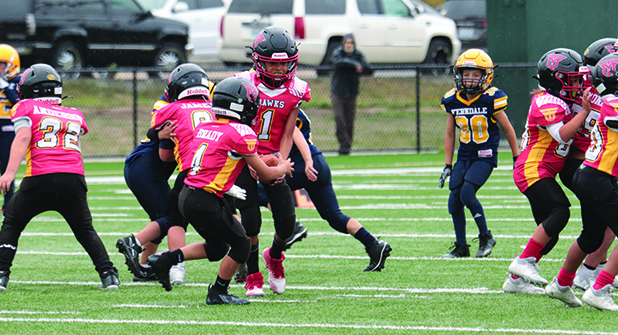
By Wade Sheldon, Tulalip News
The stands were electric, without concern for the rain, thanks to the newly covered bleachers at the Alpheaus “Gunny” Jones, Sr. ball field in Tulalip. The Tulalip-Marysville Hawks Midget and Peewee football leagues faced off against the Golden Eagles from Ferndale on Saturday, September 23.
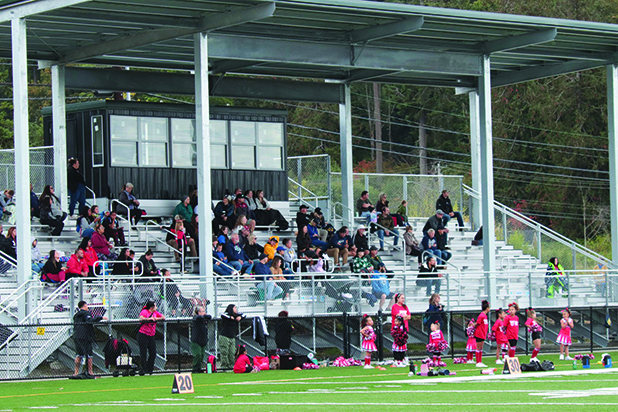
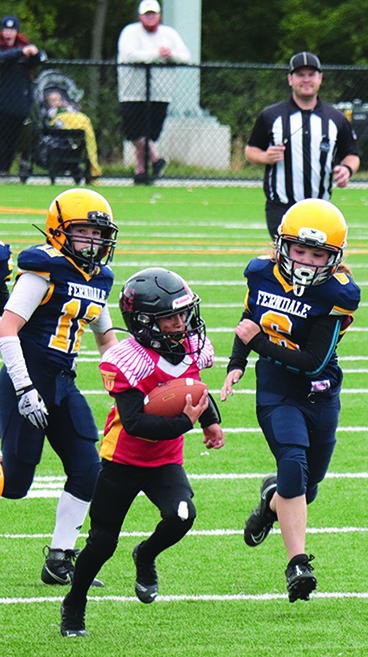
First up was the Midget league consisting of boys and girls 10–12 years old. The Hawks were off to a slow start and fell behind early in the game as Ferndale took the lead 14-6. After some halftime adjustments, the Hawks battled back with two touchdowns in the 3rd quarter due to a couple of fumbles by Ferndale, giving the Hawks the lead heading into the fourth. With another fumble in the fourth quarter by Ferndale, the Hawks recovered the ball, drove down the field, and put the game out of reach with a 6-yard touchdown, extending their lead to 18. The final score of the contest was Tulalip-Marysville 32, Ferndale 14.

A tough fought contest; ultimately, the several turnovers Ferndale endured in the second half, mixed with some great runs by the Hawks, gave Tulalip-Marysville the win and brought their record on the season to 2-2. Coach Marshall Guthrie said, “It started slow, but we ended up doing good. The kids did great and fought hard out there, and we got the win.”
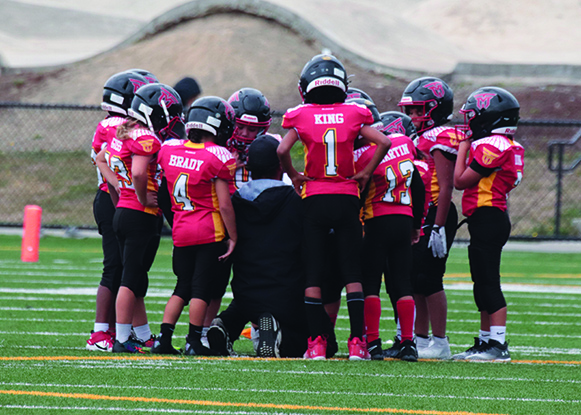

Next up were the Peewee League kids from 9 to 11 years old. Coming off a 3-game losing streak, the crew from Tulalip-Marysville were looking to turn things around. The Hawks offense started on high cylinders, bouncing off defenders and bursting across the field, scoring early in the first quarter. Their defense ran a shutdown performance, holding the Golden Eagles scoreless in the first half. Looking in control on both sides of the ball, the Hawks extended their lead 19 to nothing in the fourth quarter. Looking like a shutout, the Ferndale Golden Eagles managed to break free for a long run, scoring a touchdown as time ran out, leading to the final score of Tulalip-Marysville 19, Ferndale 6, giving the Hawks their first win on the season and bringing their record to 1-3.
Catch the Hawks on their home field, Saturday, September 30th; kickoff starts at 10:00 a.m.
September 23, 2023 syəcəb
Follow the link to download the September 23, 2023 issue of the syəcəb
Bronze, Beautiful and Beyond
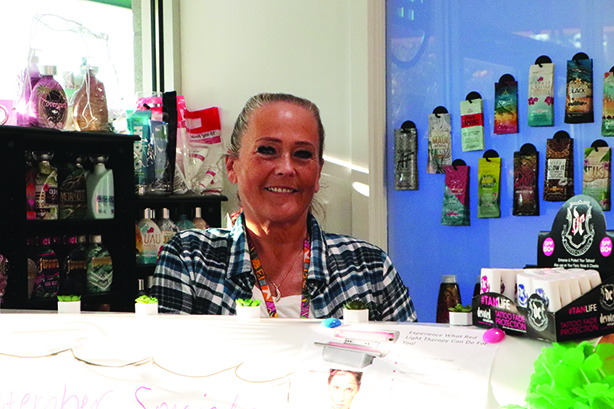
By Wade Sheldon, Tulalip News
Step into a world of sun-kissed sophistication as you enter the doors to Tropical Flutter. The Tulalip tribal owned business, which opened in June of this year, offers tanning, lashes and more.
Owner Deanna Muir, alongside her son and daughter, brought in several high-tech tanning stations that offer a few different options. Each tanning bed is different, and you can lay down or stand up, the choice is yours. Some features the tanning beds offer are air-conditioning, red-light therapy, UVA and UVB bulbs, extra sun, and aroma therapy.
Tulalip News recently sat down with Deanna Muir to discuss what it’s like to be in the tanning business.

Tulalip News: What led to opening your shop?
My kids and I wanted to open something that would sustain us into the future. I’m looking at retirement in 3-5 years and I wanted someplace to go after I retire.
Desribe some of biggest obstacles when opening your own business.
Financing was the biggest obstacle. But we were able to get a small business loan which is a feat in and of itself. Then we had supply chain issues due to covid. Our equipment was supposed to be here in March but didn’t come until May, and we weren’t able to open until June.

What are some benefits of using tanning beds?
We have UV tanning beds. They have UVA and UVB bulbs and they help give you vitamin-d and give you bronze skin. We have red light therapy that helps with fine lines and wrinkles.
What are some of the amenities offered?
We also have spray tanning, lash extensions, lash extension fills, and acrylic nail and nail art.
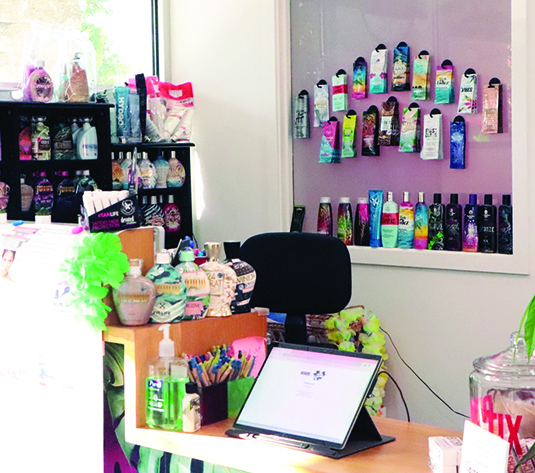
What else do you want readers to know about when it comes to Tropical Flutter?
We want them to come in and feel like family because that’s how we feel they are.
If you would like to know more about Tropical Flutter, they are open Monday through Friday 10:00am to 8:30pm Saturdays 8:30am to 6:30pm and closed on Sundays. Located 8825 34th Ave NE Suite K, Marysville, WA 98271. Or call 360-716-2979
Seattle Seahawks throwback is a tribute to Coast Salish culture
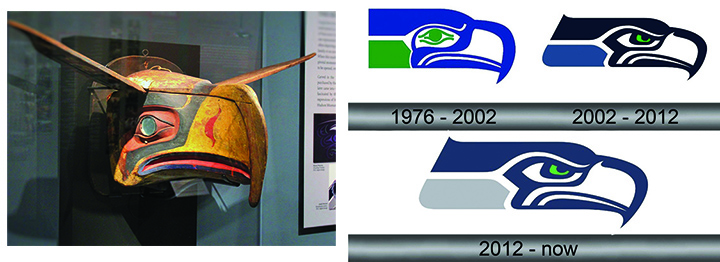
By Micheal Rios, Tulalip News
The Seattle Seahawks logo is that rarest of birds: a culturally accurate sports icon directly inspired by a Coast Salish masterpiece — and one seemingly universally embraced by the Coast Salish people who inspired the original formline design.
A design that is making a long overdue and welcomed return during the 2023 NFL season after the Seahawks announced details of the team’s official throwback uniform set to debut this fall. Over the summer, the Seahawks released photos of the Kingdome-era threads on all their social media pages and official team website to much excitement amid the fanbase.
“I’ve always been a big fan of these jerseys just seeing pictures around the building, so to put this on is pretty cool,” quarterback Geno Smith said via the team’s website. “I think fans are going to love it. It’s cool that they’re bringing it back, and it’s cool that we get to be the team that brings them back. Hopefully, the fans will love it, and we’ll go out there and kick a lot of butt in these things.”
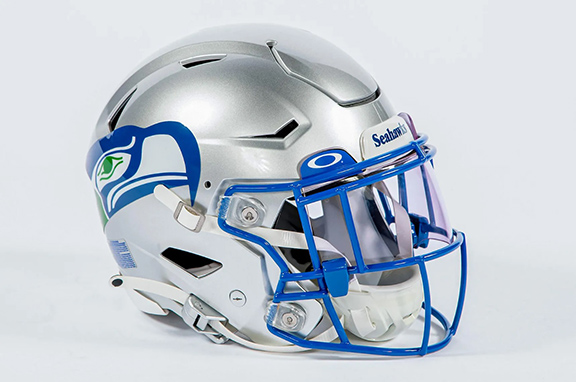
For some fans, this was a reintroduction to the team’s traditional uniforms worn from 1976-2001 that Hall of Famers Steve Largent, Cortez Kennedy, and Walter Jones wore on game days. For other fans, it was a history lesson as they viewed the royal blue, Northwest green, and metallic silver color combo for the very first time.
But beyond the traditional colors of the ‘70s is the return of the original Seahawks logo, which is generally considered a highly stylized spin on classic, Pacific Northwest formline.
Origin story unmasked
Not so breaking news! There is no such thing as an actual Seahawk. Ornithology experts theorize the term Seahawk refers to a combination of an osprey, which is a bird of prey native to coastal North America, and a skua, which, in the Pacific Northwest, we usually call a seagull. If there isn’t an actual “Seahawk” found in nature, then what inspired the professional football team’s original logo?
The consensus is that in 1976, the NFL commissioned a logo for the newly formed Seattle football team. Then-General Manager Ted Thompson wanted the Seahawks’ logo to reflect “Northwest Indian culture.” He and his team of concept designers must have been Native culture enthusiasts who stumbled across a truly remarkable piece of Indigenous Northwest Coastal art. That artwork in question was a Kwakwaka’wakw (pronounced: KWA-kwuh-kyuh-wakw), a transformation mask from northeastern Vancouver Island.
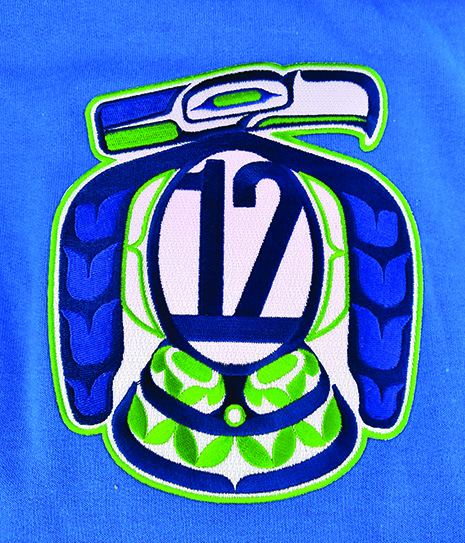
In September 2014, the Burke Museum on the University of Washington campus learned of the mask’s whereabouts and launched an online fundraising campaign to bring it back to Coast Salish territory. Raising the money needed to conserve, insure, and ship the mask across the country didn’t take long. Within weeks of arrival, the hidden history of the mask was unveiled, and the origin story of the Seahawks logo went public.
Even though the exact inspiration behind the Seahawks’ logo remained a mystery for decades, what has always been certain is its positive celebration by Coast Salish tribes. All along the Salish Sea, citizens of sovereign Native nations have used the logo to empower contemporary artists who have re-appropriated the Seahawk’s iconic imagery into our culture.
“Great things inspire imitations. In the same way that so many Native people and white people and Asians are inspired by hip-hop, an art form created by Black people, many people are inspired by our beautiful art,” said Native advocate, criminal defense lawyer, and Seattle resident Gyasi Ross. “Native people have some beautiful artwork; of course, it inspires people to want a piece of it. The Seahawks logo is a perfect example of that. And we love it.
“But also, the Seahawks are actually active and respectful of the huge Native community here in the Pacific Northwest,” he added. “From speaking at graduations to speaking out against the [old Washington] Redskins mascot, the Seahawks have a great relationship with the Native community here, both urban and reservation-based.”
The Tulalip-Seahawk connection
Their commitment to Native communities distinguishes the Seahawks from so many other organizations that claim to honor Native culture with their logos and mascots, yet contribute little or nothing to their local tribes. In fact, the Seahawks have a history of significantly impacting the Tulalip Tribes.
Back in 2008, Seahawk Bobby Engram collaborated with Home Depot, the Kaboom! Program, and Boys & Girls Clubs of Snohomish County to build a 50-by-50-foot playground at the reservation’s ‘Club.’ In 2014, following the tragic Marysville-Pilchuck High School shooting, the Seahawks hosted tribal member Nate Hatch and his family at CenturyLink Field (now Lumen Field), where they received VIP treatment from both players and coaching staff.
Additionally, Seattle Seahawks legend Michael Bennett hosted a once-in-a-lifetime football camp for Tulalip community youth in June 2019. Nearly 250 participants, ages 7 to 18, had an opportunity to catch a pass from and do drills with the Super Bowl champion. Afterward, Bennett stuck around to sign autographs and take photos with every single one of his adoring fans.
Most recently, former Seahawk players Cooper Helfet and Jermaine Kearse landed a seaplane in Tulalip Bay in exciting fashion before spending an afternoon with 30 Tulalip youth at the local youth complex.
Empowerment through representation
A history of positive impact. Countless moments to uplift Tulalip youth and inspire them to always dream big. Promoting healthy lifestyle choices and physical fitness as a means of self-discipline to achieve long-term goals. The reciprocal nature of the Seattle Seahawks organizational respect for local tribes and the empowering, prideful Native fandom they’ve garnered in return continues to manifest itself in truly imaginative ways.
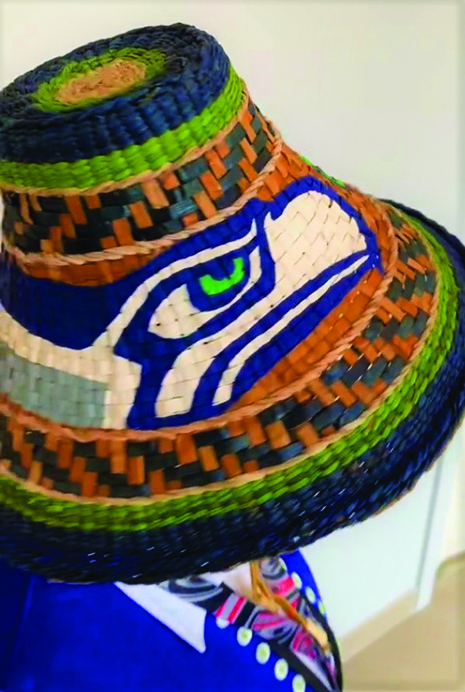
For starters, it’s common to see the Seahawks logo reimagined via eye-catching Coast Salish craftsmanship via all possible mediums. Native American artisans have reimagined the formline-based Seahawk as blankets, clothing, beaded earrings, attention-grabbing medallions, wooden panels, furniture, flags, face masks, and even six-foot chainsaw carvings that come together to celebrate the evolution of art, ingenuity, and true fandom.
“The Seahawks have given back to our community in so many ways and really made a difference in the lives of our youth,” shared Youth Services manager and lifelong fan Josh Fryberg, whose large family buys new Seahawks jerseys representing their favorite players every year. “As for the connection between the Seahawks and Coast Salish art, the roots definitely run deep. For my family, we have a lot of Seahawks-themed artwork created by very talented Native artists, both from Tulalip and other tribes. More than the art, though, the Seahawks mean family togetherness. Every Blue Friday, we rock our jerseys, and every game day we gather as a family to cheer on our Seahawks.”
The unique partnership between the Seahawks organization and Coast Salish tribes, who comprise part of the devout 12th Man fan base, took on a whole new meaning after the surprise announcement of a 10-year partnership deal with the Muckleshoot Tribe. This partnership is embodied by a Muckleshoot-created installation at Lumen Field’s north entrances. Dubbed “Muckleshoot Plaza,” this Indigenous space features a massive, reimagined Seahawk, two salmon, a canoe, and even Lushootseed text. The impossible-to-miss architecture designed by Muckleshoot artists reminds all who pass by that they are guests on Coast Salish land.
“This artwork will not only inspire our communities but also educate them on the important history of the Native Americans in this region,” said Chuck Arnold, President of the Seattle Seahawks. “We look forward to a long and meaningful partnership for many years to come.”

2023 throwback and beyond
Whether the Seattle Seahawks contend for this year’s Super Bowl or not, in the hearts and minds of tens of thousands of Coast Salish tribal members, they will always be champions. Not because they’ve hoisted a Vince Lombardi Trophy, but because our professional football team respects their local Native American communities off the field – where it matters most.
Merging the past with the present while paying tribute to tradition is embodied by those who dawn the Seahawks throwback jersey. This is why the iconic logo can be seen so vividly on Blue Fridays, worn by casino patrons as they wager on the home team, and throughout Coast Salish territory by proud members of the 12th Man Army.
Touring the new Amazon facility
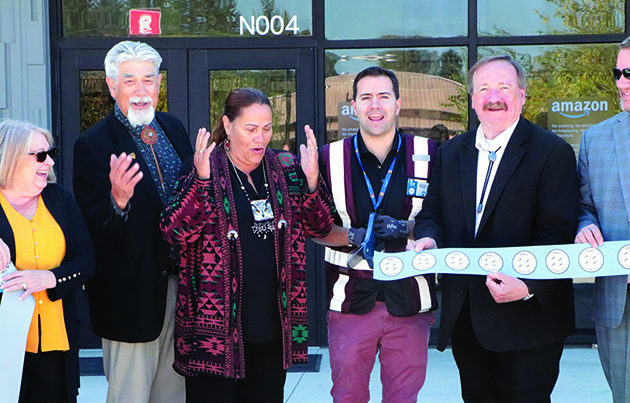
By Wade Sheldon, Tulalip News
Stepping into the new 2.9 million-square-foot Amazon PAE2 distribution center in Arlington, what first captures your attention are the extensive networks of conveyor belts that seem to extend for miles in every direction. These high-tech belts are just a small piece of the enormous operation that create a smooth flow of items throughout the facility. But what truly gives a glimpse into the future are the thousands of driverless robots moving seamlessly throughout their designated areas.
Equally fascinating is the collaboration between Amazon’s dedicated human workforce and the robots. People work in harmony with the machines, unloading to loading the 6-foot high shelves with various types of merchandise that the robots transport in and out of each workstation.
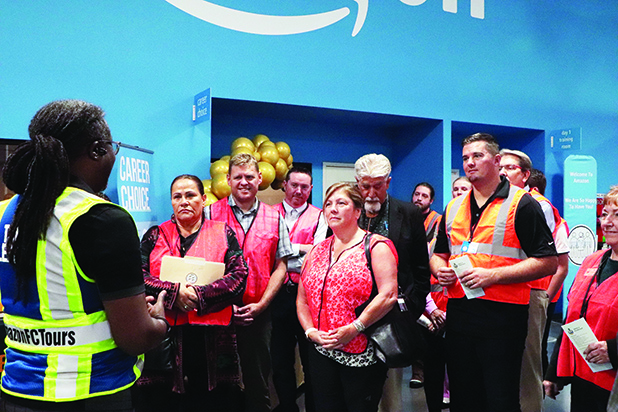
Thursday, September 14, Amazon PAE2, named after the Paine Field airport in Everett, PAE1, held a ribbon cutting unveiling the colossal structure that will offer over 1,000 jobs.
Tulalip board member Mel Sheldon and Chairwoman Teri Gobin were thanked for attending. Alongside of Snohomish County Executive Dave Somers, Arlington Mayor Barbara Tolbert, and Bruno Arnal, PAE2 General Manager, they participated in the cutting of the ribbon and celebrated the grand opening with a tour of the facilities. First of all, we are safety always,” Bruno Arnal, Amazon General Manager said. “We have the latest technology in the Amazon fulfilment center. Amazon this year alone invested over 550 million dollars in safety related project across the network. And this site, when you tour it, you will see all the latest research and development that lead to a safer workplace.
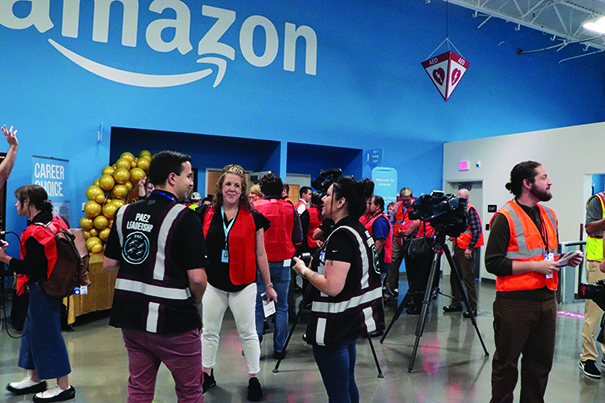
Bruno continued “Once full, this building will hold the largest number of items in the northwest. It’s a 5-story building and can house up to 40 million units of inventory. And because this building is located so close the Seattle metropolitan area, it’s going to help deliver selection at the right speed with safety, because we have the technology.”
Mayor Tolbert had the privilege of packing the first order in of the facility, saying, “This is a modern facility is built not only to serve the customer, but the employee. With the safety standards that are put in place, someone like me could step in and be trained and do the first shift effectively and safely with all the right equipment without getting hurt.
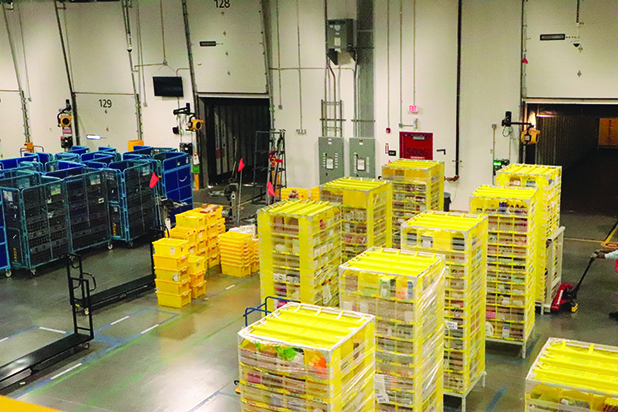
“We at the county are very much aware that the jobs of today are very different from the jobs of yesterday,” Executive Somers said. “We structured our workforce development process and have a future workforce alliance which is looking out to the future. Because we want to understand what the requirements are so we can provide the training necessary to make this facility successful.”
Awakening the Language
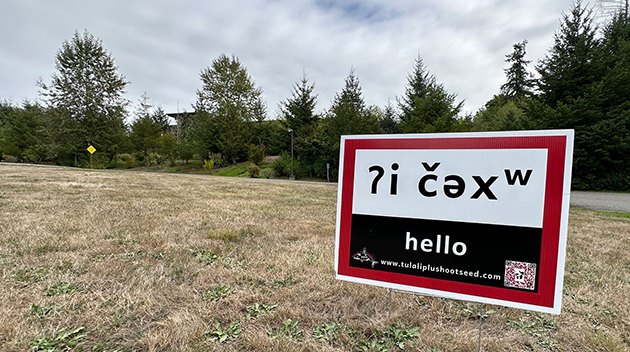
By Kalvin Valdillez, Tulalip News
An inspiring cultural reclamation is happening throughout Native America as tribes are actively working to restore their traditional languages. Once outlawed and considered a punishable offense during the years of assimilation, many Native languages were all but lost. But thanks to each respective tribe’s knowledge keepers and traditional linguists, there has been a resurgence of the dialect of our ancestors over the years.
Within the sduhubš nation, the revitalization of the Lushootseed language seems to grow stronger with each decade that passes. Ever since Hank Gobin and Toby Langen set the foundation in the early 90’s, when the Lushootseed department was established, the language has spread amongst tribal families and is now often used conversationally.
Many of today’s traditional speakers were introduced to the language by the Lushootseed department along their educational journey or through a course offered to the community. Today, the department has grown considerably in size as a number of tribal members fell in love with the language and developed a passion for sharing that knowledge with the next generation.
Known as the Language Warriors, the team of culture bearers teach Lushootseed to tribal members as young as newborn babies, infants, and toddlers at the Betty J. Taylor Early Learning Academy, as well as to students at every grade level within the Marysville School District. The department also teaches college courses and frequently holds community classes and events to ensure the language is accessible to Tulalip’s members and its community.
Keeping with the times, the Lushootseed department offered online lessons and storytelling videos through the stay-at-home ordinance during the pandemic. They also developed an educational app geared towards kids that is based around foods. And we’d be remiss to mention their website, an online Lushootseed database that provides the spelling of a variety of words and phrases in the Lushootseed alphabet as well as an audio clip of the pronunciation of each word. The website also includes several video lessons and as well as traditional stories. Their homepage is updated regularly and shares the department’s upcoming events and activities.
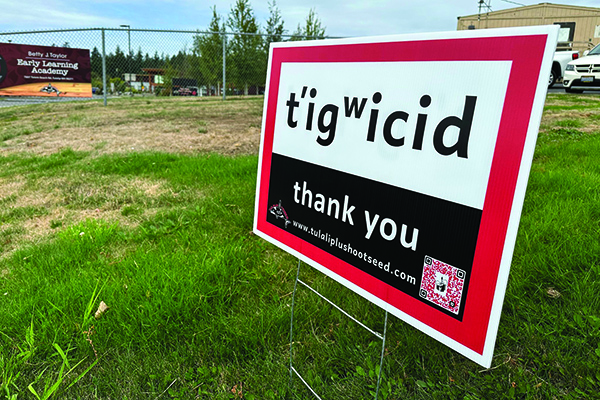
If you were to visit www.tulaliplushootseed.com this very moment, you would find three phases listed at the top – ʔi čəxʷ, huyʔ, and t’igʷicid which translates to hello, goodbye, and thank you in English. The Lushootseed department chose these three phrases to kick-off a new initiative aimed at getting the entire community speaking the language on an everyday basis.
It’s been only a few weeks since the department announced the initiative via a cute video titled ‘Are You Smarter Than a 5-year-old?’, in which a tribal youth effortlessly spoke the three phrases and gave the definition of each word. The video ends with the tagline ‘get your Lushootseed on’, and challenges all of Tulalip to implement these words into their daily interactions and eradicate the English counterparts from their vocabulary completely.
“ʔi čəxʷ, t’igʷicid, and huyʔ are the three phrases we are starting off with – just trying to eliminate those three words in English, that is our goal for the rest of the year,” explained Interim Lushootseed Manager, Michelle Myles. “This was something fresh we could work on to get the community speaking the language. We were looking for ways to get the language out there to share it, where it’s not in the classroom, not with a teacher, and it’s something you could use with family members and share it in that way.”
With fall knocking on the door, the Lushootseed department recently provided a treat for the community in the form of eye-catching yard signs. Posted in highly visible areas, all throughout the 22,000-acre reservation, each sign displays one of the three phrases that local commuters can view and then in-turn practice while enroute to wherever their destination may be. For foot traffic, those active runners and walkers journeying across the rez, there is a QR code at the bottom of every sign. When scanned with a smartphone, the code will bring you to the Lushootseed department’s website where people can learn more about the challenge and hear the pronunciation of each phrase.
“These are three things that everyone can say,” exclaimed the Lushootseed department’s Video Producer/Director, Brian Berry, who has been instrumental in getting the initiative off and running. “It actually started here at the Lushootseed department. There are some signs here in the building that say, ‘English words we’re not going to use anymore’. That kind of got my brain spinning that we as employees and tribal members should replace these three phrases, using the Lushootseed ones instead of the English ones. The QR code will take you to our website. We got a little slot on there – three commercials that I put together, thirty second spots that we’re pushing out on Facebook, trying to get everyone to speak the language.”
The signs can be spotted all along Marine Drive, as well as in front of various department buildings and public spaces such as the Administration building, the Gathering Hall, the teen center campus, and the Tulalip Bay Marina. The signs are also located at the Betty J. Taylor Early Learning Academy, the 27th Ave. school campus which includes Heritage High and Quil Ceda Tulalip Elementary, as well as at the Marysville Getchell campus and the Marysville Pilchuck campus.
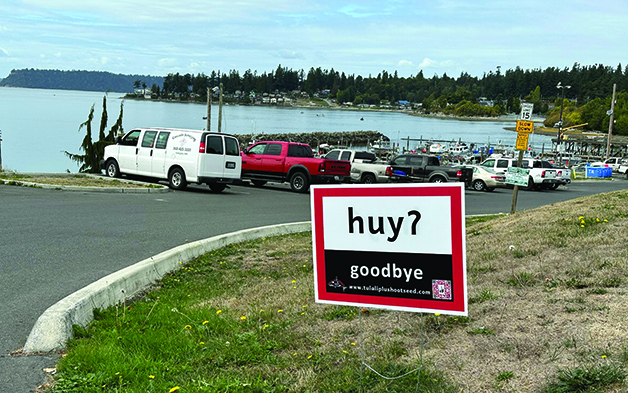
The effects of the initiative are already taking place as numerous governmental employees are utilizing the three phrases in their e-mails and in-person interactions. It’s amazing to see how the Tulalip people are reclaiming their language and are making strong efforts in preserving Lushootseed by passing down the teachings to current day citizens and the future leaders of Tulalip.
“This is who we are and where we come from,” expressed Michelle. “Lushootseed is part of our culture, and we should be able to embrace it and share it with everyone. It’s beautiful. I’ve been working at the department for over 20-some years now and it’s nice to see this freshness and all the new innovations we can use to inspire people to speak the language. It feels good. It’s awakening the language. And this initiative is keeping it awake, spreading it and sharing it with everyone.”
For more information about the initiative, the three phrases and how you can help spread the ancestral word, please visit the Tulalip Lushootseed website.
